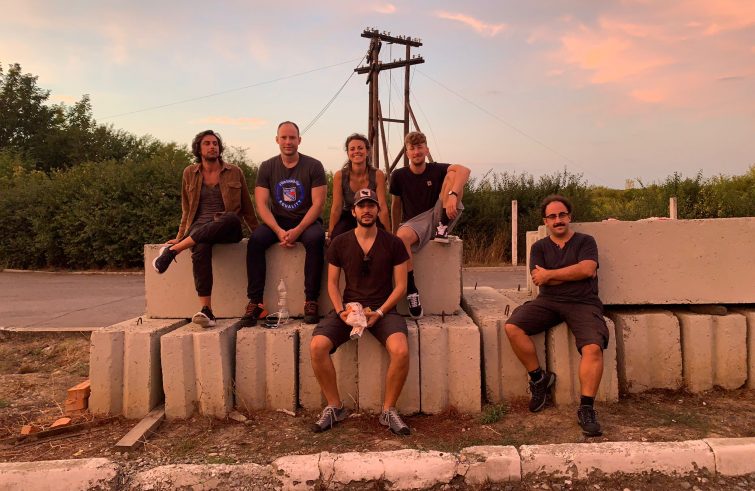
According to Google Maps, 1,010 kilometres separate Berehove, on the Ukrainian-Hungarian border, from Odessa. It is a 16-hour journey, through the Carpathian Mountains, villages and vast cornfields populated by storks. The vans loaded with humanitarian aid proceed along the route. They form part of the Stopthewarnow initiative, which set out from Gorizia on August 29, with the city of Mykolaiv as its final destination. The caravan includes 50 Italian volunteers. The inscription on the bonnet, “humanitarian aid”, sparks interest in the local population. A woman comes up and says in Italian: “‘Thank you for what you are doing. Your help is important to us.”
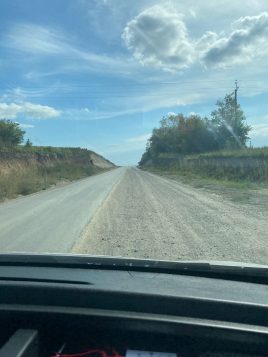 But the journey also involves the unexpected. At one point the road changed and we were suddenly travelling on an unpaved road: for 33 kilometres the vans had to proceed very slowly. Two of the vehicles had a flat tyre. The unexpected incident lengthened the journey. The caravan reached Odessa at dusk. At night, it is pitch black. This is also a consequence of the war. There is no lighting at night. Before entering the city, however, the volunteers were met with yet another unforeseen event. At the first check point, the caravan managed to pass, but at the second check point, after having checked their documents several times, the military imposed a U-turn. There was no room for negotiation. The caravan only entered the city after 5 a.m. once the curfew was over.
But the journey also involves the unexpected. At one point the road changed and we were suddenly travelling on an unpaved road: for 33 kilometres the vans had to proceed very slowly. Two of the vehicles had a flat tyre. The unexpected incident lengthened the journey. The caravan reached Odessa at dusk. At night, it is pitch black. This is also a consequence of the war. There is no lighting at night. Before entering the city, however, the volunteers were met with yet another unforeseen event. At the first check point, the caravan managed to pass, but at the second check point, after having checked their documents several times, the military imposed a U-turn. There was no room for negotiation. The caravan only entered the city after 5 a.m. once the curfew was over.
“Building peace is certainly demanding and also exhausting”, says Giampiero Cofano, head of the delegation and Secretary General of the Pope John XXIII Community, in charge of organising the caravan on behalf of 175 associations and movements. “In a way, the journey provides training in non-violence and patience when confronted with unforeseen events and uncomfortable situations. It is a personal experience while at the same time fostering team building. An initiative such as the peace caravan requires a very subtle approach, especially given the context we will be facing over the next few days. This journey serves to build relationships, friendship and trust. These days of travel may seem endless, but they are not, because those are the days that true peace-makers have on their agenda.”
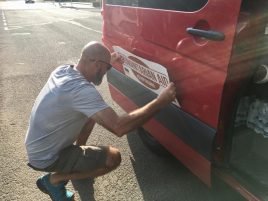 This morning the volunteers will make a final assessment of the risks connected with the situation in Mykolaiv and regarding the route ahead of them. Yesterday the city was heavily bombed, and the bridge connecting it to Odessa was hit by Russian missiles. “If we receive confirmation that the roads are open we will head for Mykolaiv to bring humanitarian aid and to meet our brothers and sisters who are waiting for us. Civil authorities will also be there.” Italian volunteers from the John XXIII charity have been living in Mykolaïv for the past three months. “We want to bring seeds of peace through our presence”, says Cofano. “Obviously, we are not negotiators, nor are we the ones who will resolve the conflict, but we said ‘I care’, and we care about dedicating our lives to a greater dream. What we care about is to shake hands and embrace those people who are weeping and praying with us in the shelters. Being there with them is the most precious seed of peace we can bring today.”
This morning the volunteers will make a final assessment of the risks connected with the situation in Mykolaiv and regarding the route ahead of them. Yesterday the city was heavily bombed, and the bridge connecting it to Odessa was hit by Russian missiles. “If we receive confirmation that the roads are open we will head for Mykolaiv to bring humanitarian aid and to meet our brothers and sisters who are waiting for us. Civil authorities will also be there.” Italian volunteers from the John XXIII charity have been living in Mykolaïv for the past three months. “We want to bring seeds of peace through our presence”, says Cofano. “Obviously, we are not negotiators, nor are we the ones who will resolve the conflict, but we said ‘I care’, and we care about dedicating our lives to a greater dream. What we care about is to shake hands and embrace those people who are weeping and praying with us in the shelters. Being there with them is the most precious seed of peace we can bring today.”
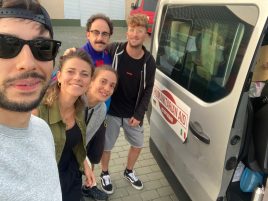 Participants in this new peace caravan include Msgr. Giovanni Ricchiuti, bishop of Altamura, president of Pax Christi, representing Italian bishops. “We are here to show those who are suffering that we are near them – he say – near those who continue cherising hope despite their suffering. We are here to suffer and to hope together with them.” He added, commenting on the endless atrocities of war: “When I looked at the flags of peace waving after six months of war, I realised that their colours had faded. It’s hard to nourish hope when the logic of weapons, of war, is seen as the only solution to all problems. It’s the sad and bitter truth. We know we are wandering in the darkness of night but we also ask ourselves: when will dawn come? We are working for the dawn of peace to break as soon as possible.” Tomorrow the bishop will meet the people of Mykolaiv: “If possible, more than words, I wish to offer a fraternal embrace. I believe that the people we are going to meet don’t need many words but acts of solidarity and of closeness.”
Participants in this new peace caravan include Msgr. Giovanni Ricchiuti, bishop of Altamura, president of Pax Christi, representing Italian bishops. “We are here to show those who are suffering that we are near them – he say – near those who continue cherising hope despite their suffering. We are here to suffer and to hope together with them.” He added, commenting on the endless atrocities of war: “When I looked at the flags of peace waving after six months of war, I realised that their colours had faded. It’s hard to nourish hope when the logic of weapons, of war, is seen as the only solution to all problems. It’s the sad and bitter truth. We know we are wandering in the darkness of night but we also ask ourselves: when will dawn come? We are working for the dawn of peace to break as soon as possible.” Tomorrow the bishop will meet the people of Mykolaiv: “If possible, more than words, I wish to offer a fraternal embrace. I believe that the people we are going to meet don’t need many words but acts of solidarity and of closeness.”
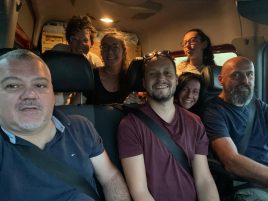 “Sixteen hours crammed into a minibus. Some of us were in 5, some 6, there were seven of us in the van, with a heap of boxes full of all kinds of goods to keep us company, from biscuits to pasta, from plasters to soap bars. And yet, these hours are the real destination, because we are learning that being together, being close, is seldom simple. Despite the difficulties of this long journey, however, we are united in our goal, against the backdrop of this yellow and blue flag representing the wheat and the sky of Ukraine.
“Sixteen hours crammed into a minibus. Some of us were in 5, some 6, there were seven of us in the van, with a heap of boxes full of all kinds of goods to keep us company, from biscuits to pasta, from plasters to soap bars. And yet, these hours are the real destination, because we are learning that being together, being close, is seldom simple. Despite the difficulties of this long journey, however, we are united in our goal, against the backdrop of this yellow and blue flag representing the wheat and the sky of Ukraine.
(San Vincenzo minibus from Abbiategrasso, Milan)
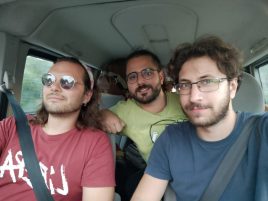 “Since we cannot put an end to the war just by our sheer will, we have decided (with humility) to be a little more uncomfortable, sharing some of that pain, including being physically as close as possible to those who, today, are among the drowned. This is not a matter of heroism, but of representing an alternative humanity which is available, in the eyes of both the Ukrainians, who are seeing the fruits of their constructive efforts collapsing, and of all others, that the hope of a better future may outlive the horrors of war.” (Simone Poté, ACMOS)
“Since we cannot put an end to the war just by our sheer will, we have decided (with humility) to be a little more uncomfortable, sharing some of that pain, including being physically as close as possible to those who, today, are among the drowned. This is not a matter of heroism, but of representing an alternative humanity which is available, in the eyes of both the Ukrainians, who are seeing the fruits of their constructive efforts collapsing, and of all others, that the hope of a better future may outlive the horrors of war.” (Simone Poté, ACMOS)
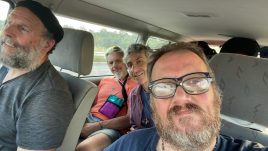 “This situation is as complex as it is hard to understand, and no one here is an expert in geopolitics. Truth is, we don’t know why, for what or how this war broke out and we don’t know when it will end. All we know is that we love these people who have nothing left and we also love those young Russians who were sent here to die without knowing why… We are here because we love the human being in his/her totality… and we love him/her because the same Father who created us, loves us with infinite love. (Minibus of Fr Samuele, Alberto Giulio and Pino)
“This situation is as complex as it is hard to understand, and no one here is an expert in geopolitics. Truth is, we don’t know why, for what or how this war broke out and we don’t know when it will end. All we know is that we love these people who have nothing left and we also love those young Russians who were sent here to die without knowing why… We are here because we love the human being in his/her totality… and we love him/her because the same Father who created us, loves us with infinite love. (Minibus of Fr Samuele, Alberto Giulio and Pino)
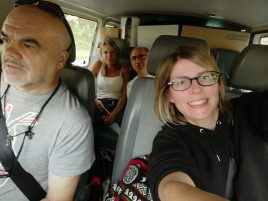 “The most genuine meaning of this journey, which saw the participation of people from all parts of Italy, is to share the tragic experience of war with those who have been affected by it, in the knowledge that silencing all weapons is the only way forward.” (Abg23 minibus)
“The most genuine meaning of this journey, which saw the participation of people from all parts of Italy, is to share the tragic experience of war with those who have been affected by it, in the knowledge that silencing all weapons is the only way forward.” (Abg23 minibus)












